Cyril Ramaphosa will be sworn in for another term as president on Wednesday, while the Government of National Unity (GNU) negotiating teams are still consulting on cabinet and parliamentary portfolio positions. In terms of the law, there is no deadline for Ramaphosa to name his cabinet.
READ | MG coalitions hub
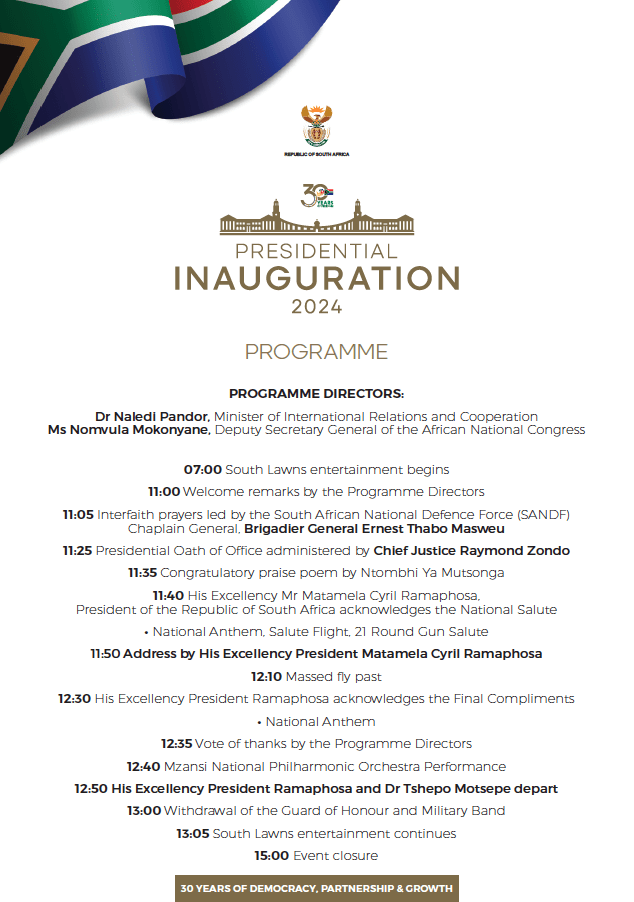
19/06 9:15
SEEN AT THE UNION BUILDINGS: The people are in charge: Limpopo Premier Phophi Ramathuba says her election to the “premier league” was a victory for voters in the province.
19/06 9:10
SEEN AT THE UNION BUILDINGS: Mmamoloko Kubayi says it has been an honour to serve in the 6th administration, and if she is called to do so, she would also welcome serving in the 7th administration.
19/06/ 9:00
SEEN AT THE UNION BUILDINGS: Western Cape Premier Alan Winde was coy when asked by the M&G’s Lunga Mzangwe if the DA would support Paul Mashatile as the deputy president of South Africa.
19/06 6:00
Inner tensions delay announcement of cabinet in Ramaphosa’s new term
There is little hope that the country will know by the week’s end who will sit in President Cyril Ramaphosa’s new cabinet, given the inner tensions in the nascent coalition.
The president’s office said Ramaphosa, who is being sworn in for another term on Wednesday, did not want to waste time, but nor would he rush what is a complex exercise.
READ THE FULL STORY BY EMSIE FERREIRA HERE
LAST WEEK’S COVERAGE OF RAMAPHOSA BEING APPOINTED FOR A SECOND TERM
15/06 00:14
Ramaphosa appointed for second term as president – Emsie Ferreira
The National Assembly on Friday night elected President Cyril Ramaphosa for another term with 283 votes, thanks to the support of the diminished ANC’s future partners in a coalition agreement that will be finetuned in coming weeks.
Economic Freedom Fighters (EFF) leader Julius Malema, who was fielded as a challenger by a loose alliance of disgruntled left-wing parties, secured 44 votes.
Ramaphosa sat pensively for a moment, before breaking into a smile after Chief Justice Raymond Zondo declared him president. He said he was humbled to accept the role, before calling the agreement to form a multi-party coalition a historic moment.
Speaking at minutes to midnight, he said it was “a new birth, a new era to our country. I do sincerely believe that this is an era of hope.”
“The result of the election has made plain that the people of South Africa expect their leaders to work together to meet their needs.”
Ramaphosa said the coalition would not consist of two or three parties but “many” and insisted that despite criticism of his use of the term, it was a government of national unity, “not a grand coalition”.
In a brief address to the chamber, Democratic Alliance (DA) leader John Steenhuisen congratulated Ramaphosa and said it was time for coalition partners to “join hands” to work together in the best interest of the country after an election that gave no party an outright majority.
In contrast, Malema was scalding, saying he agreed to contest the presidency to signal his opposition to Ramaphosa’s “marriage of convenience” with the DA.
“This is not a government of national unity, this is a grand coalition between the ANC and white monopoly capital,” he said.
“We refuse to sell out, we never did so when we were young and we will not do so now. We will be the best opposition we can be.”
Inkatha Freedom Party (IFP) leader Velenkosini Hlabisa, who nominated Ramaphosa, pledged to support the president wherever he did “the right thing”. Patriotic Alliance leader Gayton Mackenzie, who is angling for a cabinet post, said he would support the coalition.
The way the election unfolded gave an early indication of where the battle lines in the seventh parliament lie.
The EFF, United Democratic Movement, African Transformation Movement and other small parties on Friday morning agreed to challenge Ramaphosa’s election after Malema was given a cold shoulder by ANC secretary general Fikile Mbalula, sources said.
Before Zondo called for nomination for the post of president, EFF deputy leader Floyd Shivambu rose to remind newly elected speaker Thoko Didiza that his party had filed a draft motion again calling for Ramaphosa’s impeachment.
The motion, which the EFF swiftly sent to the media, calls for parliament to revive the report of a section 89 panel that found that Ramaphosa had a case to answer on misconduct charges relating to the theft of foreign currency from his Phala Phala game farm, and clandestine efforts to recover the money.
The EFF has never let go of the allegations that drove Ramaphosa to the brink of resignation in December 2022, before the report was rejected by the National Assembly.
The constitutional court last month agreed to hear an application by the EFF in which it argues that the chamber’s rejection of the report was irrational because the facts, and the rules of parliament, left no room for a reprieve for Ramaphosa.
But by raising it on Friday in a draft motion, the EFF showed that it would waste no time in stress-testing the coalition by contriving a scenario where the DA’s readiness or not to defend Ramaphosa on the Phala Phala controversy will be at issue.
The ANC and the DA parties inked a statement of intent to form a coalition earlier on Friday. Intense wrangling about the wording of that agreement continued well after the National Assembly sitting had begun.
Helen Zille, the chairperson of the DA’s federal council, confirmed after noon that the last sticking points, which she termed “important”, had been ironed out.
The nine-page document states that the government “shall take decisions in accordance with the established practice of consensus”.
But there was to and fro till the last minute as to what would happen if general consensus proved elusive.
The final text provides for “sufficient consensus” in such cases, and defines it as meaning agreement by “parties to the GNU representing 60% of seats in the National Assembly”.
Zille said the ANC had sought to make last minute changes in this regard, but she insisted that the wording be restored. She said crucially the next clause provided that any party that disagrees with a decision will be able to formally record their objections.
The agreement recognises that appointing the cabinet will be Ramaphosa’s prerogative but says that in doing so he must take into account the electoral outcomes and in consultation with the leaders of other parties in the coalition.
The IFP agreed earlier this week to enter the coalition but delayed signing the declaration of intent till late on Friday — after the election of Thami Ntuli as premier of KwaZulu-Natal in a sitting of the provincial legislature.
While ANC got the speaker position and the DA that of deputy speaker, the deal indicates that the chair of chair of parliament will be a member of the IFP.
14/06 21:30
UDM nominates Julius Malema for president – Emsie Ferreira
The United Democratic Movement (UDM) on Friday evening in the National Assembly nominated Economic Freedom Fighters (EFF) leader Julius Malema for the post of South Africa’s president.
The nomination came from UDM MP Nqabayomzi Kwankwa shortly after President Cyril Ramaphosa accepted nomination by incoming ANC chief whip Mdumiseni Ntuli.
Inkatha Freedom Party (IFP) Velenkosini Hlabisa solemnly rose to second the nomination, thereby confirming the party’s intent to join a coalition Ramaphosa calls a government of national unity.
Before Chief Justice Raymond Zondo called for nominations, EFF deputy leader Floyd Shivambu stood up and announced that the party had tabled a draft motion calling for the legislature to commence impeachment proceedings against Ramaphosa in relation to the Phala Phala controversy.
He said it had been delivered to newly elected speaker Thoko Didiza.
She told him that she had received the letter, which the EFF had promptly sent out to the media.
The draft motion, which is in Malema’s name, harks back to a report by a section 89 panel, tabled in December 2022, which recommended that Ramaphosa face an impeachment committee to answer to misconduct charges in relation to the theft of foreign currency from his game farm.
The report was rejected by the National Assembly, and Ramaphosa was re-elected as president of the ANC later that month.
The draft motion proposes that the chamber “acknowledges that the Independent Panel report is still an authoritative report on the matter, and that any failure by parliament to process the report further by establishing an Impeachment committee would be an abrogation of the duties bestowed upon parliament by the Constitution”.
It adds that “there is nothing prohibiting parliament from reviving this process”.
Didiza calmly told Shivambu that the seventh parliament will in due course consider how to handle the draft motion.
Earlier the Democratic Alliance’s (DA’s) Annelie Lotriet was elected as the deputy speaker of the National Assembly. She received a standing ovation not only from her party but from ANC MPs with Ramaphosa rising to his feet to applaud.
Lotriet’s first gesture was to congratulate Didiza on her election as speaker of the house.
“This is a tremendous honour and privilege, as well as a great responsibility, that has been bestowed to me,” Lotriet added.
“I would like to thank you for the trust you have placed in me and I will do everything not to disappoint you.”
She was the consensus candidate for the post in a coalition pact agreed by the ANC and the DA on Friday morning.
Lotriet was not the sole nominee.
The so-called “Progressive Alliance” of the EFF, UDM and other smaller parties’ nominee, Vuyo Zungula — the leader of the African Transformation Movement — received 54 votes.
Kwankwa earlier told the Mail & Guardian that the UDM has not been courted by the ANC to join the coalition. The EFF too has increasingly found itself cold-shouldered in coalition talks that continued on the sideline on Friday while the assembly sitting unfolded.
By Friday evening, only the ANC and the DA had formally endorsed the nine-page statement of intent to form a coalition government. The document carried the signatures of ANC secretary general Fikile Mbalula and the chairperson of the DA’s federal executive, Helen Zille.
The pact confirms that parties will share power in the executive and the legislature, meaning the DA will take up cabinet portfolios.
The IFP was expected to sign “shortly”, the party’s Mkhuleko Hlengwa said.
It is understood the IFP was waiting for the election of Thami Ntuli as premier of KwaZulu-Natal in a sitting of the provincial legislature, which finally happened shortly before Lotriet was announced as deputy speaker.
14/06 17:30
Thoko Didiza elected speaker of parliament – Emsie Ferreira
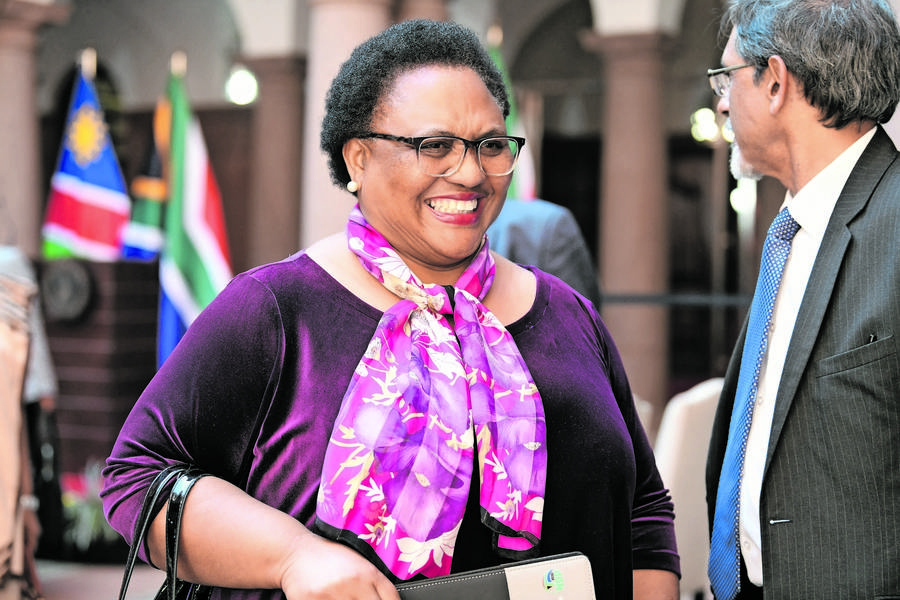 Thoko Didiza. Photo : Gallo Images/Frennie Shivambu)
Thoko Didiza. Photo : Gallo Images/Frennie Shivambu)
The ANC’s Thoko Didiza has been elected as speaker of the National Assembly with 284 votes, compared with 49 cast for Veronica Mente from the Economic Freedom Fighters (EFF).
ANC MPs erupted in applause and song as Chief Justice Raymond Zondo announced the result.
Didiza will preside over the election of the deputy speaker, the following item in the day’s proceedings. She told MPs she intended to work with all parties in a manner that reflects the will of the country.
“The role of speaker is that of ensuring that we conduct debates in this parliament within the rules, in a manner that is fair.”
Parties who have agreed to a broad coalition framework, have settled on the Democratic Alliance’s (DA’s) Annelie Lotriet as the consensus candidate for the post of deputy speaker. Before she was formally nominated, the EFF nominated Vuyo Zungula from the African Transformation Movement.
DA chief whip Siviwe Gwarube then rose and nominated Lotriet.
Electing the new speaker was slow work, thanks to a challenge to the rules by the EFF.
The party’s deputy leader, Floyd Shivambu, argued that rule 7.3 of the proceedings was unconstitutional in that it did not provide for party observers when ballots were counted.
It could not be, Shivambu repeated a few times, that only the presiding officer was present when this exercise took place.
Zondo replied that he did not make the rule — it has been in place for years. He added that he did not have the power to revise it, only a competent court could do so.
The EFF was not easily dissuaded. MP Mbuyiseni Ndlozi said the chief justice was ignoring the fact that votes on motions of no confidence were historically counted on the floor of the National Assembly, so that all could be sure there was no tampering.
After more to and fro of this kind, incoming ANC chief whip Mdu Ntuli proposed that the chief whips of parties observe counting to allay any concerns in this regard. Zondo agreed.
While vote counting was under way, ANC secretary general Fikile Mbabula told journalists that his party was “still talking to the MK” (uMkhonto weSizwe) party.
This came in spite of the ANC having inked a broad coalition pact with the DA on Friday morning. The DA is on record as refusing any cooperation with the MK party.
14/06 15:45
Boyce elected KZN speaker – Paddy Harper
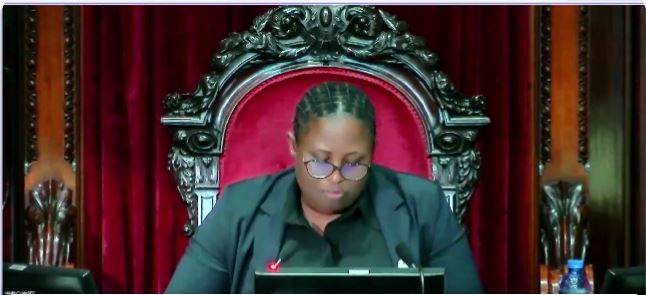 Nontembeko Boyce/ KZN X page
Nontembeko Boyce/ KZN X page
The ANC’s Nontembeko Boyce has been successfully elected as the speaker of the KwaZulu-Natal legislature by a vote of 41-39 in the 80-member house.
The result was announced by KwaZulu-Natal Judge President Thoba Poyo-Dlwati, who presided over the session, after several objections by members of the provincial legislature from both the Economic Freedom Fighters (EFF) and uMkhonto weSizwe (MK) party, including Mongezi Twala and Mervyn Dirks, respectively.
The vote in favour of Boyce was carried by the ANC, Inkatha Freedom Party, Democratic Alliance and National Freedom Party coalition, with only the EFF’s two MPs backing Dirks.
MK party members of the provincial legislature attempted to prevent Poyo-Dlwati from announcing the results and to force a recount, but they stopped doing so after she threatened to have them removed from the house by protection services.
14/06 15:13
MPs vote for new speaker – Emsie Ferreira
 Minister Thoko Didiza. Photo : Gallo Images/Frennie Shivambu)
Minister Thoko Didiza. Photo : Gallo Images/Frennie Shivambu)
MPs were voting for a new speaker of the National Assembly on Friday afternoon, with the position expected to go to the ANC’s Thoko Didiza, in terms of a broad agreement on a coalition government.
A loose alliance of parties not included in the coalition pact were backing Economic Freedom Fighters’ MP Veronica Mente, nominated by the African Transformation Movement.
Just before the vote, Didiza told the M&G the task seemed rather intimidating.
“Eighteen parties, wow,” she said.
The sitting got under way on Friday morning while party negotiators were still dotting the i’s and crossing the t’s on a deal termed a “statement of intent” on a broad coalition deal.
In terms of the accord, Democratic Alliance (DA) MP Annelie Lotriet will be nominated as deputy speaker, with the support of the ANC.
DA federal chairwoman Helen Zille confirmed that the agreement would also see the party enter into cabinet, although which portfolios it would control would only be decided in coming weeks.
The document makes plain that the “GNU2024 shall include cooperation in both the executive and the legislature”.
Zille said the decision was one that prompted much soul-searching in the DA but the alternative to governing with the ANC was leaving the country in the hands of a “doomsday alliance” whose members did not subscribe to the Constitution.
This is a reference to a pact that would include the Economic Freedom Fighters and uMkhonto weSizwe party.
In the opening paragraphs of the nine-page deal clinched on Friday morning, parties said the outcome of last month’s vote held the risk of “further political and social fragmentation” in South Africa.
“At this historic juncture, we must act to ensure stability and peace, tackling the triple challenges of poverty, unemployment and inequality, entrench our constitutional democracy and the rule of law, and to build a South Africa for all its people,” the document continues.
“The people of South Africa expect us to work together as political parties to achieve these objectives, and to usher in a new era of peace, justice and prosperity for all.”
The agreement sees parties commit to a list of priorities, with rapid economic growth and job creation and combating poverty at the top the list, and alleviating poverty to create a more just society close behind.
It also includes “livelihood support, land reform, infrastructure development, structural reforms and transformational change, fiscal sustainability, and the sustainable use of our national resources and endowments”, and a promise to fight corruption.
It stipulates that the coalition government will take decisions by consensus.
Where general consensus cannot be achieved, decisions will be taken by “sufficient” consensus, defined as having the support of parties who hold 60% of seats in the National Assembly.
14/06 14:51
Lesufi re-elected unopposed as Gauteng premier – Mandisa Nyathi
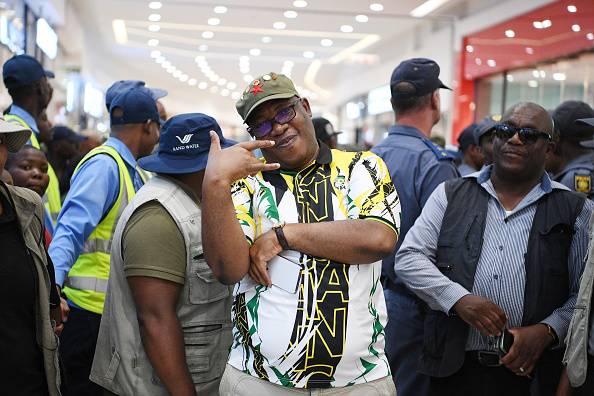 Panyaza Lesufi during the voter registration weekend drive in Mamelodi, on February 04, 2024.(Photo by Lefty Shivambu/Gallo Images via Getty Images)
Panyaza Lesufi during the voter registration weekend drive in Mamelodi, on February 04, 2024.(Photo by Lefty Shivambu/Gallo Images via Getty Images)
Despite the ANC failing to win Gauteng with an outright majority, Panyaza Lesufi was on Friday re-elected unopposed as premier of the province for a second term.
Lesufi emerged as the ANC’s preferred candidate for the job after interviews were conducted by the party’s top seven officials last week. His nomination on Friday was seconded by the Democratic Alliance’s Mike Moriarty.
Former sport, arts, culture and recreation MEC Morakane Mosupyoe was also elected unopposed as speaker for the Gauteng legislature. Mosupyoe’s nomination was seconded by uMkhonto weSizwe party.
DA MPL Refiloe Ntsekhe was elected as deputy speaker.
The ANC received only 34.76% of the provincial votes last month, necessitating a coalition government in Gauteng.
Gauteng’s judge president, Dunstan Mlambo, presided over the official swear-in ceremony of all members of the provincial legislature.
Commenting on his election, Lesufi said politicians in the province must “accept the decision that has been taken by the electorate that all political parties should be part of the government”.
“I call on all parties that want to be part of the provincial government of unity to start to prepare for this task. We have been asked to work together and that is what we will do,” he said.
14/06 14:00 Check out some posts of today’s events below:
14/06 13:30
Confirming agreement, Zille says ANC’s Didiza and DA’s Lotriet will make “formidable” speaker pair – Emsie Ferreira
The Democratic Alliance will take up seats in terms of a broad agreement on a coalition government inked on Friday, Helen Zille, the chairwoman of the party’s federal executive, told the M&G.
Holding a copy of the agreement, titled “Statement of Intent of the 2024 Government of National Unity,” Zille said the party insisted it be signed if the ANC wanted its support for Cyril Ramaphosa’s election as president in the National Assembly later on Friday.
In terms of the agreement, the DA would vote for the ANC’s Thoko Didiza as speaker of the assembly, while the ANC would back the nomination of the DA’s Annelie Lotriet as deputy speaker.
Zille confirmed that the DA had tried to win agreement that the speaker would come from its ranks but said she believed Didiza and Lotriet would make a formidable team.
“There is not a man in the house who they would not confront and stare down. So we have got a really formidable team there.”
She described the agreement as the product of much soul-searching within the DA, and long nights and days of talks with ANC negotiators that finally saw sign-off only after the National Assembly began sitting on Friday to swear in MPs and elect the president and presiding officers.
“The major sticking points were the concept of proportionality and the concept of sufficient consensus. Those were the two sticking points,” she stressed.
“We wanted checks and balances in this document. We wanted the ANC to understand that they did not win an overall majority in this election and that things have changed for them, and so we wanted that to be reflected in the document.
“We did not want to be in a situation where we were merely propping up an ANC government. And they equally wanted as much muscle as they could get out of it. Understandably, that is what negotiations are about.”
“I think we found a good compromise but it took a long time and it took late nights and early mornings.”
Zille described taking the decision to go into the executive as a momentous one for the official opposition, not taken lightly.
There was a lot of introspection about going into the cabinet, she added.
“This is a huge step for us. When you cross a Rubicon, for better or for worse, and we will have to see which one it is, you have a lot of introspection, no question.”
She said talks about revisiting contentious legislation and potentially devolving powers to provinces would follow in coming weeks.
“We are going to negotiate a programme of government in the next six weeks.”
14/06 12:40
Didiza and Mente nominated for National Assembly speaker – Emsie Ferreira
The ANC nominated Thoko Didiza for National Assembly speaker on Friday when the sitting resumed after a brief caucus the EFF demanded. Didiza accepted the nomination.
African Transformation Movement leader Vuyo Zungula then rose to nominate the EFF’s Veronica Mente for the post.
United Democratic Movement leader Bantu Holomisa seconded her nomination, which Mente accepted.
Chief Justice Raymond Zondo said that ballot papers would be prepared and suspended proceedings. He told MPs that they were welcome to have lunch during the break, suggesting it would be substantial.
Meanwhile, a source close to the coalition negotiations said there was no agreement as yet on cabinet positions, or whether the DA would agree to take up seats in the executive.
These details will still be thrashed out in coming days, he said. However, the ANC wants the DA to come into cabinet.
“It is natural that this happens in a government of national unity, or a coalition if you prefer to call it that.”
The Democratic Alliance had wanted the position of speaker, but one of the party’s MPs told the M&G the ANC was never realistically going to let it go to another party.
WATCH: Panyaza Lesufi is sworn in to the Gauteng Legislature
14/06 11:30
Drama at start of voting for KZN legislature speaker – Paddy Harper
The vote for speaker of the KwaZulu-Natal legislature has gotten off to a dramatic start, with the Umkhonto we Sizwe party requesting that members use black pens to protect their identities.
MK party MPL Mervyn Dirks, that party’s nominee for speaker, made the request to KwaZulu-Natal provincial judge president Toba Poyo-Dlwati ahead of the vote, in which he is contesting the ANC’s Nontembeko Boyce.
Dirks said they had been made aware that a “certain” party had given its MPLs coloured pens in order to track how they vote – a reference to the ANC, some of whose MPLs are believed to have divided loyalties between the ANC and MK.
Poyo-Dlwati said that she would not entertain a debate on the matter, but adjourned the house to prepare for the vote, saying she would address the issue when the session resumed.
Boyce was nominated by Inkatha Freedom Party (IFP) MPL Mntomuhle Khawula and seconded by Democratic Alliance provincial leader Francois Rodgers, whose parties are part of the proposed government of provincial unity along with the National Freedom Party (NFP).
The MK party has 37 seats out of 80, the ANC 14, the IFP 14, the DA 11 and the NFP 1.
The Economic Freedom Fighters (EFF) have two seats.
If any of the ANC MPLs vote against their choice of candidate, it will deliver either a hung legislature or a MK victory, depending on the numbers.
14/06 11:30
To caucus, or not to caucus, that is the question – Emsie Ferreira
Chief Justice Raymond Zondo announces that we will now proceed to the election of the speaker. He calls for nominations.
The EFF’s Floyd Shivambu protests, reminding him that he has called for a break to caucus.
Zondo asks him to repeat his request. Shivambu does so, adding that it was in line with the law to ask for time to “caucus about the process that is about to happen now”.
Zondo replies, to laughter from other parties: “But why would you not have caucused before?”
Shivambu protests again, at which point Zondo says he will allow a comfort break of 15 minutes. He suspends proceedings.
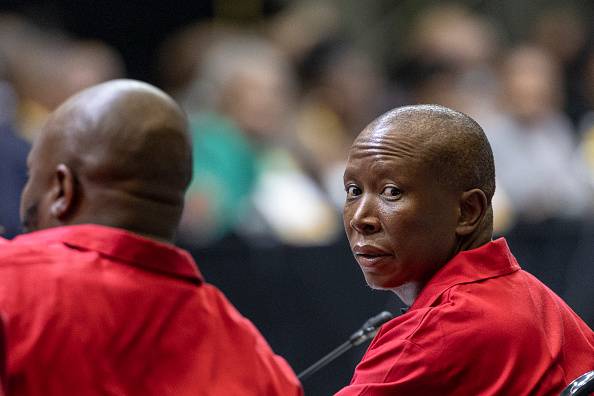 Economic Freedom Fighters (EFF) leader Julius Malema looks on during the first sitting of the new South African Parliament in Cape Town on June 14, 2024. (Photo by Wikus de Wet / AFP)
Economic Freedom Fighters (EFF) leader Julius Malema looks on during the first sitting of the new South African Parliament in Cape Town on June 14, 2024. (Photo by Wikus de Wet / AFP)
14/06 11:00
ANC gets speaker too in last minute coalition deal – Emsie Ferreira
The ANC has refused to bow to the Democratic Alliance’s demand that the speaker of the National Assembly come from its ranks.
A deal was reached, as the inaugural sitting of the National Assembly got underway, that the position would instead be filled by the ANC’s Thoko Didiza. The deputy speaker will be a member of the DA.
This marks a major coalition talks victory for the ANC, as opposition parties had been adamant that the same party should not lead both the executive and the legislature.
The Democratic Alliance will accept cabinet postions in return for ceding that of the speaker to the ANC, sources close to the coalition negotiations said.
However, these appeared to be continuing apace while MPs were sworn in by Chief Justice Raymond Zondo.
DA chief negotatior Helen Zille rushed out of the chamber and took up a seat outside, texting on her phone.
She told the media she was too busy to take questions.
Talks went “down to the wire”, one Democratic Alliance MP told the Mail & Guardian, with no agreement in place as politicians began piling into the Cape Town Convention Centre, where the assembly was sitting.
The Economic Freedom Fighters, which has found itself sidelined in the negotiations, marched in late. The party’s MPs took their seats well after Zondo had started swearing in elected MPs.
Zondo said it was an honour for him to preside over a historic sitting that marked an important moment for the country “having finished 30 years of our democracy and starting another 30 years”.
South Africa now had an opportunity to ensure that “we do not repeat the mistakes of the first 30”, Zondo said.
14/06 10:30
“Progressive Caucus” says ANC has snubbed them – Mandisa Nyathi
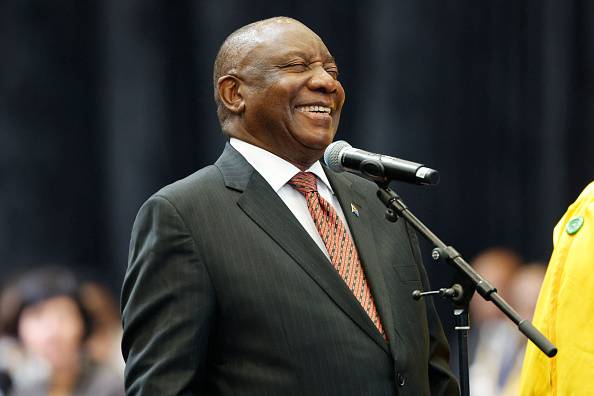 ANC president, Cyril Ramaphosa, while being sworn in to the new parliament in Cape Town, on Friday. (Photo by WIKUS DE WET/AFP via Getty Images)
ANC president, Cyril Ramaphosa, while being sworn in to the new parliament in Cape Town, on Friday. (Photo by WIKUS DE WET/AFP via Getty Images)
Smaller opposition parties in Parliament have accused the ANC of using the government of national unity (GNU) to disguise their alliance with the DA and IFP.
They said that the ANC did not offer them “equal chances” to contribute to the GNU government.
The parties, including the Economic Freedom Fighters, the Pan Africanist Congress of Azania, the United Democratic Movement, Al Jama-ah, the United African Transformation, and the African Transformation Movement have formed what they call a Progressive Caucus.
Speaking during a media briefing, EFF deputy leader Floyd Shivambu called on the ANC not to agree to a coalition government with the DA.
Shivambu’s call follows the party’s decision not to enter into the GNU due to the ANC’s advanced talks with “right-wing and reactionary political parties”, which the EFF contends is the DA.
On Thursday, party leader Julius Malema said the party would enter into a coalition with a smaller party to contest other positions, touting its national chairperson Veronica Mente for speaker or deputy speaker, and Shivambu for finance committee chairperson.
On Friday, Al Jama-ah leader Ganief Hendricks called on the ANC to meet with the Progressive Caucus because the GNU was a “smokescreen”. “They should all consider a national front. We cannot return to white rule. There will be a bloodbath,” Hendricks said.
UDM leader Bantu Holomisa said if the ANC was honest from the start, it would have shared its agreement with all parties. “We have never demanded any positions,” he said.
The briefing follows the gathering of the smaller parties on Thursday night, where they raised concerns over President Cyril Ramaphosa’s commitment to engage with all parties.
They said that talks had been “meaningless and fragmented”, and there had been no substantive outcomes.
The parties said they had a right to form an integral part of the discussions that would develop a government of national unity, and in ensuring the creation of an effective Parliament.
14/06 10:00
DA MPs confirm there is no agreement on who will be speaker – Emsie Ferreira
“It is down to the wire,” one told M&G 20 minutes before the sitting was due to start.
Rise Mzansi’s Sabine Meabe said the party believed that “the party that leads the executive cannot lead the legislature”. However, the ANC has not agreed to this, which is also the view of the DA.
Rise Mzansi will support Cyril Ramaphosa’s election as president.
The party has not finalised coalition talks with the ANC. It will resume talks after Friday’s sitting.
How the National Assembly first sitting will unfold
Parliament, Friday, 14 June 2024 – Today is the first sitting of the National Assembly (NA) as determined by the Chief Justice, Raymond Zondo. The first sitting is a formal sitting where designated members are sworn in and where the Presiding Officers are elected to constitute the National Assembly.
The first sitting of the National Council of Provinces is scheduled to take place tomorrow, 15 June at the Cape Town International Convention Centre.
The NA is elected to represent the people and to ensure government by the people under the Constitution. It does this by choosing the President, providing a national forum for public debate of important issues, passing laws, and overseeing the executive.
During today’s sitting Chief Justice Zondo will preside over the sitting and the swearing in of all the designated members present at the sitting.
Following the swearing in of the members, members will nominate candidates for the position of Speaker.
Election of the Speaker
Chief Justice Zondo calls for the nomination of candidates for election as Speaker of the NA and will announce the names of the person(s) duly nominated.
If only one valid nomination is received, Chief Justice Zondo declares the nominated candidate duly elected.
If more than one valid nomination is received, a vote is taken by secret ballot and proceedings are suspended until the results of the voting can be announced to the House.
After the announcement of the elected candidate, the Speaker takes the Chair, expresses his or her sense of the honour conferred upon him or her and presides over the election of the Deputy Speaker.
Election of the Deputy Speaker
The Speaker calls for the nomination of candidates for election as Deputy Speaker.
The Speaker announces the name(s) of the person(s) duly nominated.
If only one valid nomination is received, the Speaker declares the nominated candidate duly elected.
If more than one valid nomination is received, members will vote by secret ballot and proceedings are suspended until the results of the voting can be made known.
After the announcement of the elected candidate, the Deputy Speaker expresses his or her sense of the honour conferred upon him or her.
The proceedings will be suspended until 14:00
When the House resumes, the election of the President of the Republic will get underway.
Election of the President of the Republic
The Speaker takes the Chair and invites the Chief Justice to preside.
The Chief Justice calls on Members to nominate candidates for election as President
The Chief Justice announces the name(s) of the person(s) duly nominated.
If only one valid nomination is received, the Chief Justice declares the nominated candidate duly elected.
If more than one valid nomination is received, a vote is taken by secret ballot and proceedings are suspended until the results of the voting can be announced to the House.
The Speaker then takes the chair and invites parties and the President-elect to address the House.
The Speaker adjourns the House.
Issued by the Parliament of the Republic of South Africa
14/06 06:00
Unity government over first hurdle as Cyril Ramaphosa awaits second term
Cyril Ramaphosa’s proposed government of national unity appears to have made it over the first hurdle and goes into Friday’s National Assembly session with an agreement on speaker, deputy speaker and president.
The ANC has secured the support of the Democratic Alliance (DA) , the Inkatha Freedom Party (IFP), Rise Mzansi and the Patriotic Alliance (PA) in these crucial votes, with the proposal still being discussed by its national executive committee at the time of writing on Thursday.
The parties have secured a broad agreement on how they will work together and were busy working out the details around what positions each would hold in a new administration ahead of Friday’s first sitting.
It is not clear at this point whether the DA will take up cabinet seats or whether it will rather take on roles in chairing parliamentary committees, supporting the ANC on key votes.
READ THE FULL STORY BY OUR POLITICS TEAM HERE
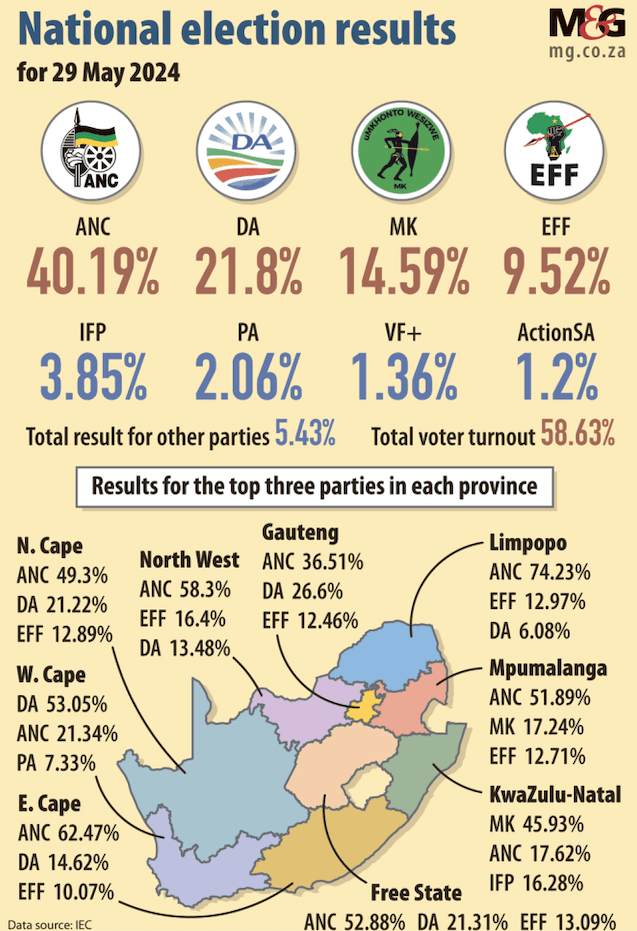 Results for May 29 elections, 2024.
Results for May 29 elections, 2024.
President of the African National Congress (ANC) Cyril Ramaphosa gestures after he was announced South African president after members of parliament voted during the first sitting of the country's new parliament in Cape Town on June 14, 2024. (Photo by WIKUS DE WET / AFP)